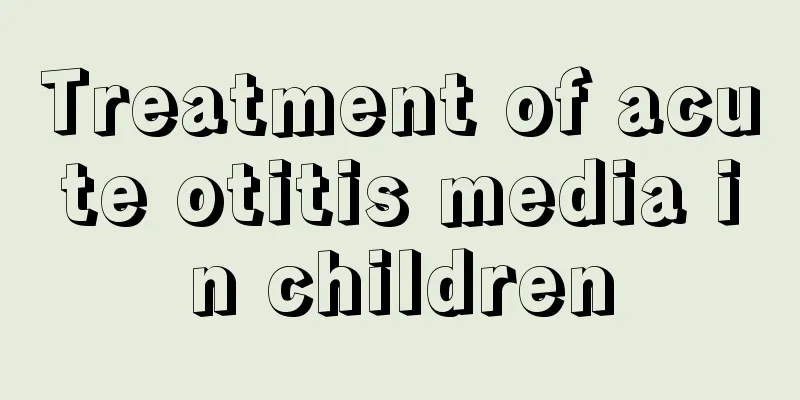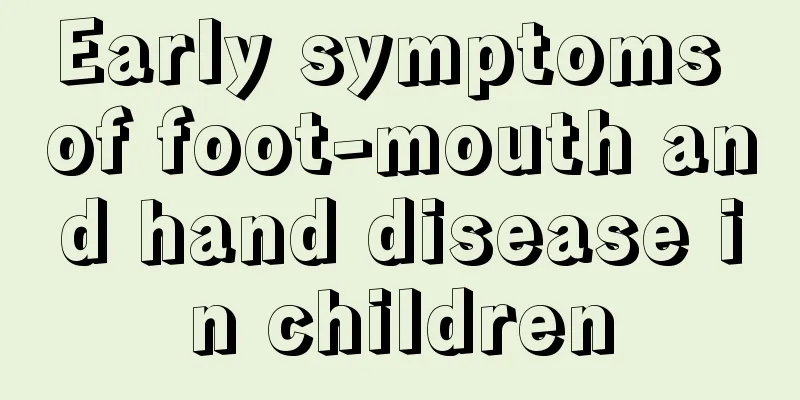Treatment of acute otitis media in children

|
For children, it is necessary to continuously increase their resistance, and only in this way can the occurrence of diseases be reduced. Colds are a common disease among children and are unavoidable, but what we fear most are actually other diseases caused by colds. For example, acute otitis media is a disease symptom that troubles both parents and children. However, judging from the treatment methods for acute otitis media in children, the cure rate of this disease is very high. 1. Observation For simple AOM, antibiotics can be used for observation without the use of antibiotics, and antibiotic treatment can be delayed for 48 to 72 hours for suitable children, depending on age, condition, and follow-up compliance. Children with high-risk factors, such as anatomical abnormalities (cleft lip and palate, etc.), genetic abnormalities (Down syndrome, etc.), immunodeficiency, and cochlear implants, those with recurrent acute otitis media within 30 days, acute onset of potential chronic otitis media, and those who are difficult to follow up, should be treated promptly. Give antibiotics promptly if symptoms persist or worsen. A mild illness means mild ear pain and a body temperature below 39°C in the past 24 hours. Severe illness refers to moderate to severe ear pain and fever over 39°C. Generally, if there is no improvement in symptoms or symptoms worsen after 48 to 72 hours of observation, antibiotics should be considered. When the parents of the child have questions about the severity of the disease, follow-up consultation is necessary. 2. Antibiotic treatment The choice of first-line therapy should be based on the likely microbial communities and the expected clinical response. Amoxicillin is used as the first-line treatment for children with acute otitis media because it is widely effective against the most common susceptible bacteria, pneumococci, when used in adequate doses. It is also safe, has a narrow antimicrobial spectrum, is low-cost, and has an acceptable taste. If AOM symptoms persist, tympanocentesis is recommended for bacteriologic diagnosis. If tympanic membrane puncture is difficult and the child is infected with penicillin-resistant Streptococcus pneumoniae, clindamycin can be used. If it is still ineffective, tympanic membrane puncture, Gram staining, bacterial culture and drug sensitivity testing must be performed, and treatment will be guided by the results of further examinations. |
<<: Is it normal for a seven-year-old girl to have secretions in her underwear?
>>: Thyroid enlargement in children
Recommend
Dietary tips for two-year-old babies after weaning
As we all know, weaning a baby is a very long and...
Why do children's joints always make noises?
The reason why children's joints are always m...
Is it better for babies to talk early or late?
Babies' language abilities are different; som...
Can children take anthelmintics in spring?
Parasites are very common organisms in life. They...
How to make chicken legs as baby food?
Chicken is a meat with relatively high nutritiona...
Can children soak their feet?
The weather is getting colder and colder, and we ...
What to do if your child has severe picky eating
Each of us has our own favorite tastes and also o...
What causes children to cough at night?
If a child keeps coughing at night after catching...
What should I do if my child’s thumb turns inward?
Parents often find that their children's thum...
Children's development indicators
There should be different indicators for early ch...
The reason why baby's nose is yellow
A baby's yellow nose is a very common disease...
What are the benefits of taking a nap for middle school students?
Today's students are usually under great pres...
Treatment of a newborn baby with a fever of 38 degrees
Many of us are particularly susceptible to colds....
Why does the baby keep crying?
Babies are weak, and many of them cry because of ...
Treatment for hypothyroidism in children
Every mother wants her child to grow up healthy a...









